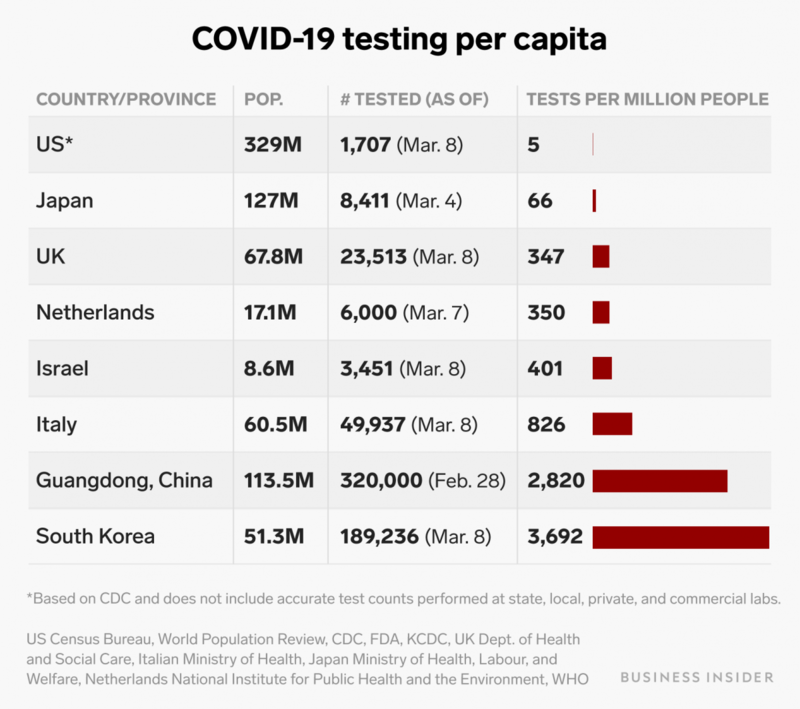The number of "real estate is the best thing ever, this can only help" posts on this thread is downright scary. Drinking the Kool Aid is strong with this one.
I own a few million in real estate investments and another few hundred k in syndication deals, but I'd still consider myself an amateur in this space. That being said, I feel like those in this thread are being WAY too optimistic and I'm not going anywhere near the industry in the near future. Maybe wrong, but here's why I'm thinking this way:
First - this is going to hit every single person in the US within 1-2 years. At this point, it's not a question of IF but a question of WHEN.https://www.cbsnews.com/live-updates/coronavirus-outbreak-death-toll-infections-latest-news-updates-2020-02-25/
The goal of the quarantines, travel restrictions, school closings, WFH policies, etc. is simply to slow down the spread of the virus so as to not overwhelm our hospitals. Here's a good graphic to explain why this would be a problem:

Every sick person is expected to infected 2-3 additional people. That's exponential "community" spreading and means that once it's out like it is, it'll be impossible to keep it from spreading everywhere. We can try cutting back on travel, WFH, and school closings but it's far too communicable to shut down the spread. The analogies to the common flu are completely naive at best - the common flu doesn't spread nearly as easily and has a mortality rate of about 1/4 of this virus (more on that later).
The only reason there aren't more cases in the US is that we have tested far fewer people. We have tested 5 people per million of population. That's 80x fewer people per million than Israel, 160x fewer people per million than Italy, and 720x fewer people per million than South Korea. There are far more cases of Covid 19 here than we know and the rate of infection will continue to double every week for the foreseeable future.

Schools are closing, businesses are WFH, airline bookings are down 70%. 2 weeks for school closing is fine, but this won't stop in 2 weeks. 2 weeks is just what we know about now. I doubt Seattle downtown opens in the next 3 months. All the businesses in Amazonia in South Lake Union are going to bleed red with no one coming into work. Many will go under.
Short term rentals? How long can someone float their mortgage with bookings reduced by 70%? How skinny have the margins on those short term rentals gotten as more and more people got into that space? Good luck refinancing to lower your rate when you can't get your place booked at anything close to the going rate.
Hourly workers will be let go. Open positions won't be filled. Then it'll move to the businesses that support those industries most affected. This will trickle to all part of the economy. Yes, some parts will prosper (it's a good time to own stock in hand sanitizer companies!) but reduced spending, reduced consumer confidence, lower profits, reduced wealth effect - these will all have impacts on the economy. This will be slow, until it's not - and then it will be fast and long.
Also, if the infectivity rates and mortality rates are what they look like, this will kill a few million people in the US. A FEW MILLION PEOPLE. Furthermore, this hit the elderly much harder while cases in children are much less fatal.

An older population passing away affects far more than if this was concentrated with children. Older people own homes, have money, spend money. The mortality rate for those 60 and older is 10%. There are 47 million elderly Americans. Even if the mortality rate is only 1%, that's 470,000 elderly Americans that this disease will claim. If it's 10% (God forbid), that's 4.7 million people, and that's just the elderly. For comparison, 405,000 Americans died fighting in WWII. That's going to completely decimate housing stocks in retirement areas like Florida, Palm Springs, Phoenix, etc. Yes, younger people will back fill the vacant homes, but the trickle down effect will mean this will ease demand for housing, lowering prices, lowering rents, etc.
Why?
The population growth rate is already lower than it has been in 50 years. https://www.nytimes.com/2019/12/30/us/usa-population-growth-decline-census.html.
With immigration down, birth rates down, and a virus that might kill 1% of the population, we're looking at an inevitable population decline. Population decline, especially among housing-aged populations, means demand for housing will inevitably drop. Just like when population growth is going like gang busters, housing and rents go up. When populations decline, housing doesn't do well (see Japan's housing crisis https://www.standard.co.uk/news/world/japan-is-giving-away-homes-in-bid-to-tackle-countrys-unique-housing-crisis-a4010601.html)
Again, I'm presuming that the experts are right and that 1) everyone gets this in 1-2 years, 2) the mortality rates stay consistent 3) the government isn't able to mitigate the effects completely. I could be wrong, I hope I'm wrong, and would love to hear how I'm wrong.












